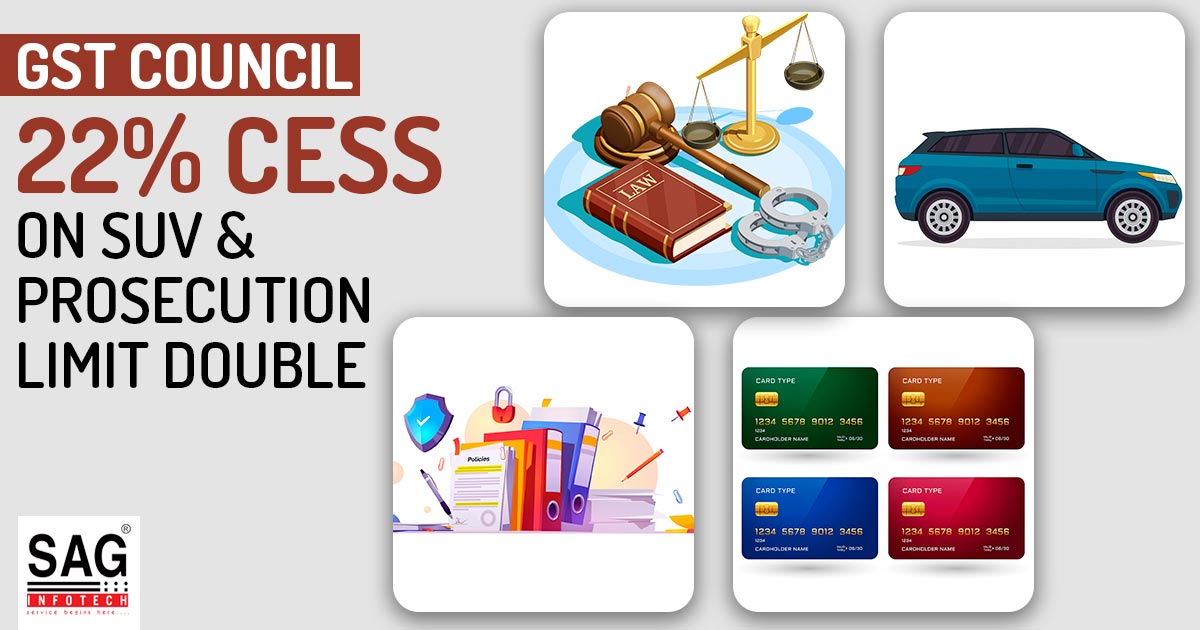
The GST Council approved decriminalizing specific crimes and doubled the limit to the launching prosecution beneath the tax act to Rs 2 cr, however, kept the limit at Rs 1 cr for bogus invoicing.
The department, for the SUVs (sport utility vehicles), charges a 22% compensation cess over the 28% GST and would have chosen to carry out the via parameters to define MUVs (multi-utility vehicles).
The department can decide on only 8 from 15 agenda items because of the less time said FM Nirmala Sitharaman post-48th GST meeting, she added that there are no new taxes would be drawn in.
FM mentioned in a matter of SUVs that, a 22% compensation of cess would be subjected to be applied to a motor vehicle fulfilling all four conditions –learned as SUV; has engine capacity exceeding 1,500cc; length exceeding 4,000 mm; has a ground clearance of 170 mm and exceeding than that.
“So this clarification is not a new tax, it’s more to say what defines that commodity which is under taxation as SUV,” the minister stated.
States asked for the MUVs to draw down in the definition, FM cited on MUVs starts when some of the states questioned if sedans must be included in the SUV segment.
Read Also: GST Impact on Cars and Spare Parts Industry in India
If any additional motor vehicle class is required to be counted under 22% cess seek FM before the council, central and state tax officers (or the Fitment Committee) shall discuss that.
Centre along with the states would try to increase the GST base at every level so as to surge the tax mop-up that is nearly Rs 1.4 lakh cr every month.
“So the focus will be on how much all of us are putting effort… to widen the tax base,” she expressed.
At present times there are 1.40 cr assessees who are enrolled beneath GST.
Revenue Secretary Sanjay Malhotra expressed that a “path-breaking decision” related to the decriminalization of 3 sorts of GST crimes- preventing the officer in release his responsibilities, deliberate tampering with material proof; and failure to supply data.
The min limit of tax amount to initiate prosecution beneath GST would surge from Rs 1 cr to 2 cr excluding the breach of invoice issuance without any goods or service or supply or both.
Indeed, the compounding amount would have been reduced to the range of 25 to 100% which is 50 to 150% of the tax amount at present.
Central Board of Indirect Taxes and Customs (CBIC) Chairman Vivek Johri mentioned that beneath the GST law crimes that are more than Rs 1 cr would be acknowledged for criminal prosecution.
“What was proposed in Council and what came out of the discussion was that the limit would be enhanced from Rs 1 crore to Rs 2 crore now. So cases involving tax amounts of up to Rs 2 crore will go out of the purview of criminal action, except cases of fake invoicing,” Johri expressed.
For the bogus invoicing the present limit of Rs 1 cr to launch the criminal prosecution shall be carried.
The guidelines would be provided to the central GST officers for initiating the prosecuting for breaches of more than Rs 5 cr. via the circular the same directions would be provided, however, the GST law would have set out the limit of Rs 1 cr.
The revisions to the GST law would provide the effect to the decision of the department upon decriminalisation of GST offences as drawn in the Finance Bill, 2023.
The revision would indeed be passed by the state legislatures and build the way to make the revisions effective.
A lesser tax rate upon pulses husk to zero from 5% would have been decided by the GST department. Tax on ethyl alcohol supplied to refineries for blending with motor spirit (petrol) would have been lessened from 18% to 5%.
GST rate revision would be done for the “facilitation of trade and measures for streamlining compliances in GST”.
18% GST is applied to Rab (a type of jaggery) and fryums are manufactured via the extrusion process.
The insurance firms that provided no claim bonuses do not levy any GST.
Indeed the Central Government pays the incentive to the banks through the policy promotion of RuPay Debit Cards and low-value BHIM-UPI transactions are comes in the kind of subsidy and hence no tax would be levied under GST.
Related to the e-commerce for the micro-enterprises, the GST department would have decided to permit the unregistered suppliers for doing the supply intrastate goods via E-commerce Operators (ECOs) from the date October 1, 2023.
The department would permit the in-principle consent to permit the unregistered suppliers to incur the intrastate supply of goods via e-commerce Operators (ECOs), authorizing the revisions in the GST act and regulations.
In a statement, “Considering the time required for the development of the requisite functionality on the portal as well as for providing sufficient time for preparedness by the ECOs Council has recommended that the scheme may be implemented w.e.f. 01.10.2023,”
A revision in the CGST rules 2017 would be suggested, on the refund to the persons who would not have enrolled under GST, including the issuance of the circular for defining the process to file the GST refund application via the unregistered purchases in these matters.
The same would be a bigger relief for the common person since the unregistered purchasers would be enabled to claim the tax refund for the cases in which the contract for services or supplies such as the construction of a flat/house and long-term insurance policy would be cancelled, along with that the time duration for the issuance of the credit note via the related supplier would lapses.
Jain specified that “This change will allow the unregistered buyers to get a refund of the GST where supply has not taken place, and will help avoid unnecessary cost burden,”